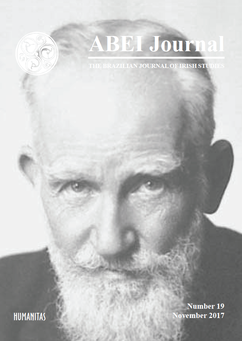Linguistic Fluidity and Unrealized Territories in Brian Friel’s Translations
DOI:
https://doi.org/10.37389/abei.v19i1.3509Abstract
Before completing Translations (1981), Brian Friel registered in his diary the wish that the play dealt with “language and only language,” saying
that the text would be “lost” if it became overwhelmed by the political context in which it is set. A number of critics quote this diary entry in order to argue that language in Ireland is inextricably political. However, the reading of language solely through an Irish/British binary risks identifying Ballybeg natives and British officers as two opposing, yet homogenous groups. An analysis of Friel’s preliminary notes for Translations complicates this binary by introducing the concept of linguistic fluidity, which emphasises the importance of other languages, as well as different means of communication operating in the play.
Moreover, an analysis of his manuscripts can enrich our understanding of
language in his oeuvre by recognizing, without being necessarily centred in, the binary negotiation between colonizers and colonized.


